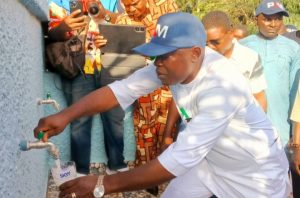
Survivors, Not Victims: Redefining Human Trafficking Stories
…NAPTIP, ICMPD train partners on amplifying survivor voices in the fight against human trafficking
For thousands of survivors of human trafficking in Nigeria, telling their stories is not only a pathway to healing but also a critical tool in exposing traffickers. But, many choose silence to avoid sensational reportage which fuels stigma and retraumatization from the society that supposed to care.
To reverse this trend, the National Agency for the Prohibition of Trafficking in Persons (NAPTIP), in partnership with the International Centre for Migration Policy Development (ICMPD), held a two-day training over 50 journalists, civil society organizations (CSOs), and press officers at Benin city, Edo State, Nigeria.
The training, part of the Netherlands-funded Schools Anti-Trafficking Education and Advocacy Project (STEAP) drew participants from the five pilot states of Edo, Enugu, Delta, Ogun, and Benue.
With the theme “Ethical Media Reporting on Human Trafficking and Irregular Migration”, the Director General, NAPTIP, Hajiya Binta Adamu Bello emphasised the need to build the capacity of media practitioners, among other partners, to protect the right and dignity of survivors while exposing the offenders of transnational and well organized crime.
While stating that human trafficking is a major challenge affecting both the young and the old, male and female, the NAPTIP Director General, represented by the Benin Zonal Commander, Barr Sam Offiah, commended the initiative and ICMPD for massively investing in the 4 year project.
Hajiya Bello stated , ”It is commendable that ICMPD, with the support of the Kingdom of the Netherlands, has continued to intervene with meaningful impact in some critical areas of counter trafficking projects ”
”On our part, as the focal Agency of the Government of Nigeria in combating issues of human trafficking, we shall continue to strengthen our collaboration with all state and non-state actors to eradicate human trafficking in the country. Specifically, we shall continue to scale up our strategies to increase the interception and rescue of survivals of human trafficking, improve partnership and policy implementation, increase enlightenment and awareness, and ultimately, ensure prosecution of offenders”
For Rhoda Dia-Johnson, the Project Manager at ICMPD, journalists are not just conveyors of news but watchdogs, educators, and change drivers.
“When reporting is sensational or stigmatizing, survivors are silenced. It delays their recovery, weakens awareness campaigns, and even undermines national and international efforts against trafficking,” she warned.
Dia-Johnson explained that the training focused on ethical reporting and monitoring, evaluation, and learning (MEL) practices to ensure interventions are not just visible but effective and impactful.
Since STEAP’s launch in 2024, over 35,000 students in 250 schools across five high-risk states have been reached, with 60 percent being girls. “This is about creating stronger networks, practical tools, and a survivor-centered approach that drives real change,” she added.
A sobering highlight of the workshop was a presentation by Mr. Vincent Adekoye, Press Officer at NAPTIP, Abuja. He revealed that the agency has rescued more than 22,000 survivors and secured over 750 convictions since inception.
According to Mr. Adekoye, beyond sex work and forced labour, new methods now include baby factories, crypto-pregnancy scams, orphanage trafficking, fake scholarships, sham football clubs, and recruitment via social media.
“Traffickers prey on poverty, unemployment, and the lure of opportunities abroad,” Adekoye said. “The media must go beyond reporting; it must investigate illicit financial flows and expose traffickers’ hidden networks.”
He further explained that traffickers often subject victims to oath-taking and intimidation, instilling deep fear that prevents them from speaking out.
If participants can apply survivor-centered reporting as presented by speakers, trafficking stories will highlight survivors’ rights, push for justice, and spotlight systemic gaps.
Also, ethical storytelling can mobilize policymakers, CSOs, and the public to demand accountability, ensure survivors receive compensation, rehabilitation, and support, while weakening traffickers’ power and reshaping response.


